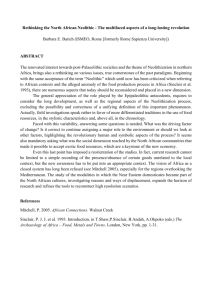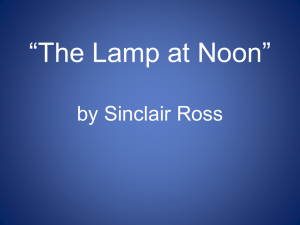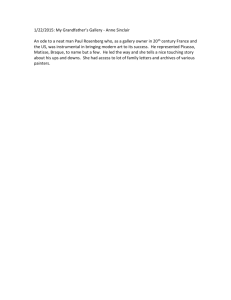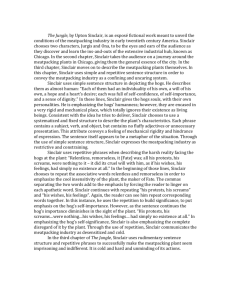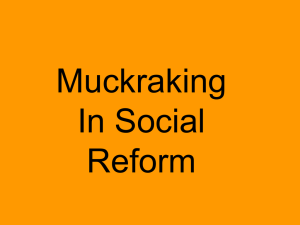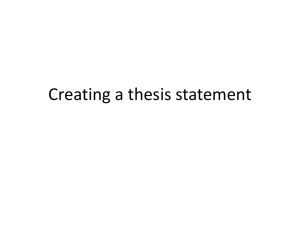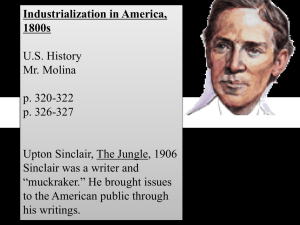Exploring Philosophy: My background I`ve read a bit. High school
advertisement
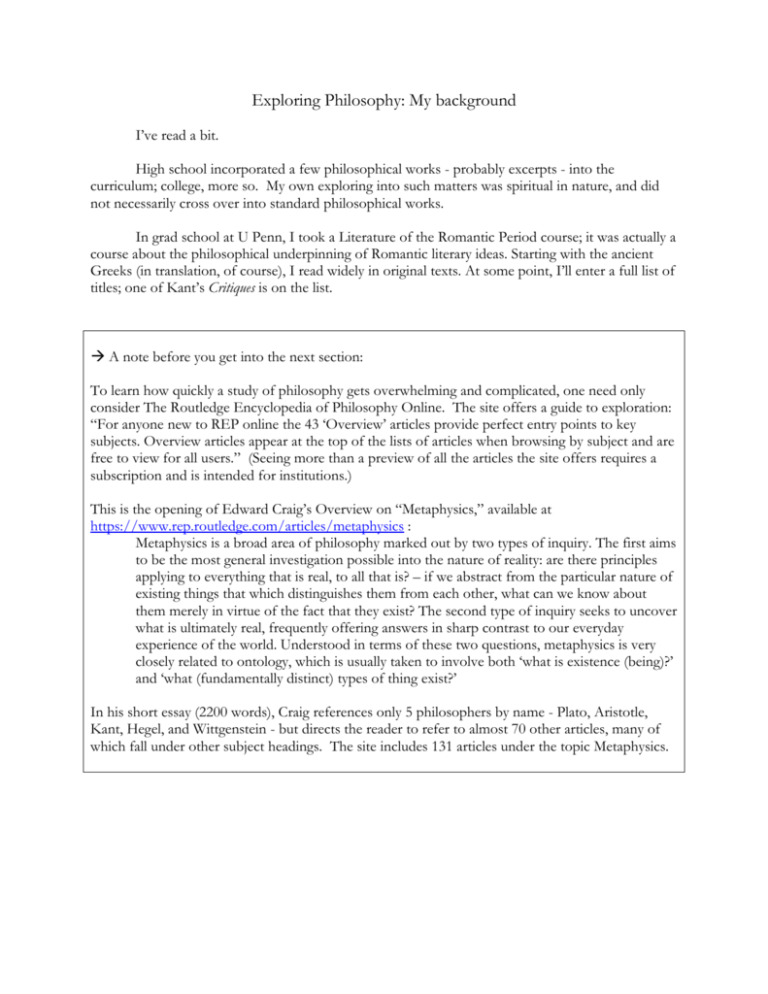
Exploring Philosophy: My background I’ve read a bit. High school incorporated a few philosophical works - probably excerpts - into the curriculum; college, more so. My own exploring into such matters was spiritual in nature, and did not necessarily cross over into standard philosophical works. In grad school at U Penn, I took a Literature of the Romantic Period course; it was actually a course about the philosophical underpinning of Romantic literary ideas. Starting with the ancient Greeks (in translation, of course), I read widely in original texts. At some point, I’ll enter a full list of titles; one of Kant’s Critiques is on the list. A note before you get into the next section: To learn how quickly a study of philosophy gets overwhelming and complicated, one need only consider The Routledge Encyclopedia of Philosophy Online. The site offers a guide to exploration: “For anyone new to REP online the 43 ‘Overview’ articles provide perfect entry points to key subjects. Overview articles appear at the top of the lists of articles when browsing by subject and are free to view for all users.” (Seeing more than a preview of all the articles the site offers requires a subscription and is intended for institutions.) This is the opening of Edward Craig’s Overview on “Metaphysics,” available at https://www.rep.routledge.com/articles/metaphysics : Metaphysics is a broad area of philosophy marked out by two types of inquiry. The first aims to be the most general investigation possible into the nature of reality: are there principles applying to everything that is real, to all that is? – if we abstract from the particular nature of existing things that which distinguishes them from each other, what can we know about them merely in virtue of the fact that they exist? The second type of inquiry seeks to uncover what is ultimately real, frequently offering answers in sharp contrast to our everyday experience of the world. Understood in terms of these two questions, metaphysics is very closely related to ontology, which is usually taken to involve both ‘what is existence (being)?’ and ‘what (fundamentally distinct) types of thing exist?’ In his short essay (2200 words), Craig references only 5 philosophers by name - Plato, Aristotle, Kant, Hegel, and Wittgenstein - but directs the reader to refer to almost 70 other articles, many of which fall under other subject headings. The site includes 131 articles under the topic Metaphysics. For my Capstone project, I researched a now-almost-forgotten British writer named May Sinclair and suggested that she had rejected the gendered constraints of her culture and chosen not to marry. Sinclair saved 68 letters sent to her by a friend, Anthony Deane; I transcribed, researched and analyzed the letters. (Her side of the exchange was lost.) I posited that Deane was actually a romantic suitor, and that the letters documented the decline of their relationship as she discovered the impossibility of the match: the letters show evidence that Sinclair and Deane argued, heatedly, about religion and philosophy. The decidedly religious believer Deane was preparing to be a leader in the Church of England, and sought to convince Sinclair to agree with the ideas he espoused. I claimed that that the agnostic Sinclair - herself a brilliant philosopher - was not willing to give up her own beliefs. My 144-page paper presents an overview of the rules and expectations of marriage in May Sinclair’s day, discusses how two biographers characterize May Sinclair and her relationship with Deane, discusses the letters’ debate by providing an explanation of each philosophical reference, and then examines Sinclair’s first published works to conjecture about her attitudes and observations concerning the limitations and downsides of marriage; it ends with 8 pages of Works Cited entries. Of course, this project necessitated my own study of the points they debated. Unquoted text below is taken from my own Capstone; quoted texts are fully cited in that paper. [New comments are bracketed.] This bulleted list is not a complete summary; rather, it highlights some of the major ideas of this section, which totals nearly 70 pages. The term “odium theologicum,” which refers to “bitterness developed during or typical of controversy about religion and giving rise to an unyielding refusal to continue a discussion” Deane’s beliefs Richard Jefferies’s Life of the Fields, especially the essay “The Pageant of Summer” St. Anselm’s “Credo, ut intelligam”, which essentially comprises the basic foundation of a Christian faith … By referring to St. Anselm’s “Credo ut intelligam,” Deane was telling Sinclair that she needed to allow faith to exist before searching for rational proof of God’s existence. Prof. Flint’s Theism: being the Baird lecture for 1876 – 457 pages of righteous “proof” that Christianity is the only true religion o Offering a full analysis of Flint’s Theism is beyond the scope of this paper, but I will introduce his ideas and point out some of his logical fallacies in an effort to suggest what Sinclair might have observed, and critiqued, upon reading Flint’s book. o [I discussed this book for 11 pages.] Joseph Butler, LL.D., who wrote the Analogy of Religion Natural and Revealed to the Constitution and Course of Nature in 1736. Butler’s book was Volume 10 of Morley’s Universal Library, published in 1887. Frederick Charles Copleston’s A history of philosophy, published in 1959 Sinclair’s beliefs Spinoza (1632-1677) developed the doctrine of pantheism, in which the divine is known to be present “within” the world, and not “transcendent” to it. Therefore, God and nature are one, and all things occur due to “natural necessity” – but God is not a separate and aware deity capable of intervening to alter world events. Such a view was highly disturbing to strictly traditional religious thinkers, as Spinoza had essentially defined the Christian God out of existence. o Deane refers to Spinoza as the forefather of both Hegel and Schelling, and to some degree, he is right. Idealism “transcendental ego” German Idealism (late 18th-early 19th centuries) encompasses a veritable Golden Age of philosophical writing, whose “main features … were the mind-dependence of reality, the dominance of thought over sensation, universalized ethics, and natural teleology.” Kant, Hegel, Fichte, Schelling, and Schleiermacher were all major contributors to German Idealism. o Kant’s theories of Transcendental Idealism were crucial to the development of the movement; he asserted that nothing existed outside the mind’s concept of it, and his “idea of inner freedom became the inspiration for creative genius”. Of course, Kant also “demolished the rationalistic arguments of Anselm, Descartes, and others, for the existence of God” … because … If “human cognition” determines the “order of the world,” then not only is God unnecessary, but there is no God. [Kant published Critique of Pure Reason in 1781.] o [Later works of the movement were reacting to, and perhaps arguing with, Kant’s.] Though the German Idealists did not all agree about the definition of God, they certainly did not deny the possible existence of a higher power … While Idealists often concluded that God does, in some way, exist, their theories fell too far outside the parameters of traditional religious belief to be regarded without suspicion by many laypeople. The term “agnostic,” first used in 1869, and defined as follows: “Agnostics take the stance that no knowledge of God is now possible; some say that God’s existence or non-existence will never be provable.” Note that agnostics were not atheists: “Disbelief in a proposition means that one does not believe it to be true. Not believing that something is true is not equivalent to believing that it is false; one may simply have no idea whether it is true or not.” o Like many other religious leaders of the day, Deane despised agnosticism. Sinclair’s essay, “The Ethical and Religious Import of Idealism,” which was published in the New World magazine in December of 1893 and discussed the theories of Thomas Hill Green. The essay included references to: o Hegelian absolute Idealism o To address the fundamental question “How is knowledge possible?”, Sinclair traces Green’s work in identifying Kant’s flaws and asserts that Green proved that “nature is the product of consciousness.” o Sinclair suggests, subtly, that man is God: “As thinking subject, man is absolutely one with the eternal subject which holds the universe together in the grasp of thought. Obviously there cannot be two subjects equally transcendent and equally determining the universe of things.” o Sinclair admits that Idealism can lead to a declaration that there is no God, but explains that this statement is somewhat misleading because Idealism does not “separat[e] the human and the divine.” Because they are essentially one and the same, “worship and liturgy” do become irrelevant, as does prayer if it means a “system of telegraphic messages to and from the divine.” o Sinclair suggests that Idealism “presents the religious ideal, the union of man with God, not as the far-off end and goal of his moral striving, but as an ever-present fact, the condition of his having any moral nature at all.” [Years later, Sinclair also published two books of philosophy: A Defence of Idealism in 1917, and The New Idealism in 1922. My paper did not deal with those.]

